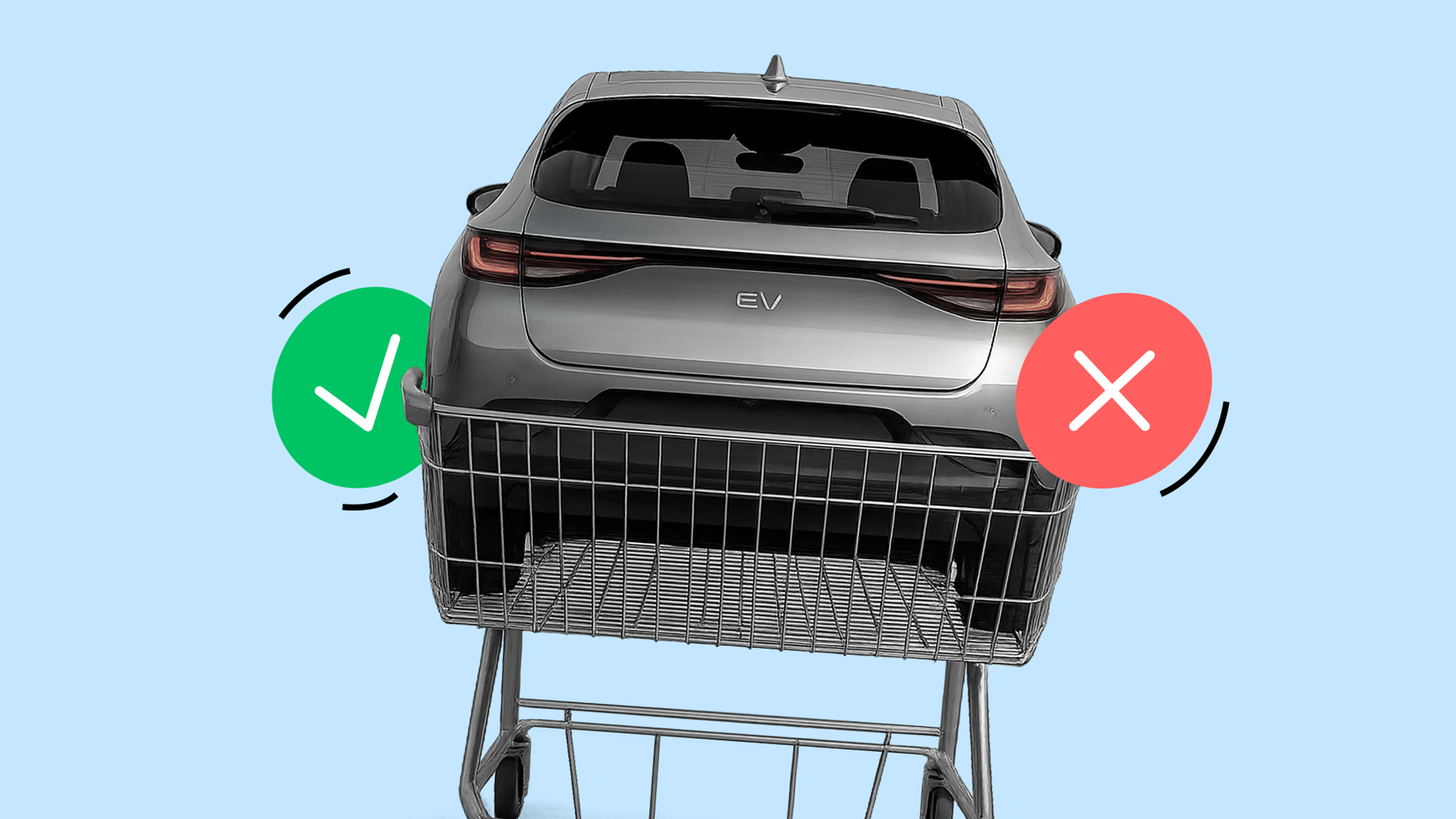01/08/2025
Uncertain times for electric vehicle makers: why aren’t buyers plugging in?

The EU has set its sights on a cleaner future, planning to pull the plug on new fossil fuel car sales by 2035. Sounds like the beginning of an electric revolution, right? Not quite.
Despite generous government incentives – tax breaks, grants, and other financial perks – drivers across Europe are proving to be creatures of habit. The moment these incentives disappear, so do EV sales.
Our recent survey sheds more light on the situation: at least half of all car buyers today wouldn’t even consider an electric vehicle. So while policymakers may be revving up for an electric future, it seems many drivers are still stuck in neutral.
Looking for a reliable car?
A well-maintained and undamaged car is the most reliable! Check any VIN code to make sure you're not buying a wreck:
What you need to know
- Half of car buyers wouldn't consider going electric, citing high prices, limited range, and weak infrastructure.
- Petrol and diesel still dominate driver preferences across Europe, with only 5.6% choosing EVs as their ideal fuel type.
- Lower maintenance costs (47.2%) and tax benefits (17.6%) are top motivators for potential EV buyers.
- Just 14% cited environmental concerns as their main reason for choosing electric.
- Poland is the most EV-skeptical nation, while Finland leads with over 26% openness to electric vehicles.
4 out of 5 buyers prioritize cars with internal combustion engines
If you asked Europeans to pick a side in the great fuel debate, most would still mutter something about “the good old combustion engine.” According to our recent survey, petrol remains the fan favorite with 43.8% of the vote, followed closely by diesel at 38.9%. Hybrids made a modest showing (10.4%), while electric vehicles… well, let’s just say they’re still stuck in the slow lane at 5.6%.
That’s right – nearly 83% of respondents prefer internal combustion over anything that plugs into a wall. And these stats span across all surveyed countries. But things get even more interesting when we dig deeper into the national psyche of EV adoption.
Some countries are more resistant to change than others – and Poland takes the top spot as the most EV-skeptical nation in the survey. A mere 0.8% of Polish respondents said they’d choose an EV as their preferred fuel type.
In contrast, Finland seems to be charging ahead with enthusiasm. Over a quarter (26.3%) of Finnish drivers said they’d go electric, with Hungary (11%) and Ukraine (11.1%) showing moderate but notable support.
The link between preferred fuel types and EV purchasing plans is crystal clear. When asked if they would buy an EV right now, more than half (51.5%) of survey participants said they would not. Only 12.2% would seriously consider it, and 36.3% sat on the fence.
Polish drivers once again proved to be the least convinced – only 6.6% would consider buying an EV. The French (8.6%) and Italians (9.1%) aren’t exactly sprinting toward the electric future either. Meanwhile, Hungarians lead the pack with 26.6% open to going electric.
Why the hesitation? High prices, scarce charging stations, and a healthy dose of EV myths are enough to make many drivers cling to their combustion engines. While EU regulators are gearing up for a zero-emission – banning new petrol and diesel car sales starting in 2035 – many people simply aren’t ready to make the switch.
Cheaper maintenance and lower taxes are among the motivators to go electric
While some drivers are still clinging to petrol and diesel engines, others are starting to see the appeal of electric vehicles. And no, it’s not all about saving the planet.
Almost half of those open to EVs, 47.2% to be precise, say they are drawn to the lower running and maintenance costs. With fewer parts that can break or wear out, EVs tend to be cheaper to keep on the road.
Taxes are another reason drivers are reconsidering what’s under their hoods. For 17.6% of respondents, lower taxes make EVs more attractive. Across the EU, many governments are offering tax breaks or full exemptions to give EV adoption a boost. Germany and France provide significant relief on annual road taxes, while the Netherlands waives registration and circulation taxes completely for electric vehicles.
Then there’s the lure of government subsidies. A total of 14.1% of drivers said financial support would motivate them to choose electric. For instance, in France, buyers can get up to €7,000 off a new EV depending on their income, which certainly helps soften the blow of that initial purchase price.
Interestingly, only 14% of respondents said they would choose an EV for environmental reasons. With cities expanding their low-emission zones, electric cars are becoming a necessity for urban drivers who want to avoid fines and stay mobile. Saving the environment may not be the top priority, but staying on the road clearly is.
Subsidy cuts put the brakes on EV momentum
As the honeymoon period for electric vehicles winds down, the reality is kicking in: without generous government backing, EV sales are starting to sputter.
Several EU nations have already pulled the plug on purchase subsidies. Sweden said goodbye to its incentives in 2022, while Germany followed suit in late 2023 – both moves leading to a noticeable slowdown in EV sales.
Across the Atlantic, things haven’t been much rosier. During Donald Trump’s presidency, EV-friendly policies took a backseat. Sales mandates were scrapped, federal tax credits trimmed or removed altogether, and funding for charging infrastructure hit the brakes. The result? A wave of uncertainty that made automakers flinch and slowed adoption even further.
Government incentives are an expensive way to boost EV sales, but the real issue is sustainability. As soon as those incentives are cut, affordability takes a major hit. True demand will only take off when people start choosing EVs organically – not because they’re propped up by subsidies.
Until then, it seems the electric revolution might be stuck in low gear.
The auto industry is navigating some choppy roads
When we’ve asked our users why they’re steering clear of EVs, their answers were loud and clear: 32% said they’re too expensive, 26.7% fear low range, 21.1% point to poor charging infrastructure, and 12% worry about low resale value.
And while buyers hesitate, manufacturers are tightening their belts.
In 2025, major carmakers are announcing large-scale job cuts in response to tariffs, shifting production strategies, and aggressive cost-cutting. Stellantis has temporarily laid off 900 workers across 5 US plants, halting operations in Mexico and Canada. General Motors is undergoing multiple layoff rounds totaling over 3,000 employees, and Nissan is reportedly slashing 10,000 jobs globally while shutting down 7 plants.
Porsche, Volvo, and Volkswagen have all announced workforce reductions, signaling a broad industry recalibration as manufacturers try to balance innovation with financial survival.
Adding even more pressure, Chinese EV brands are shaking up the status quo. BYD has taken the European market by storm, outselling Tesla in battery electric vehicle sales for the first time in April 2025 – notching a staggering 359% year-on-year growth, despite increased EU tariffs.
Whether or not European consumers will fully embrace Chinese EVs remains to be seen. But one thing is certain: their rapid rise is already sending shockwaves through the European automotive economy.
Check your VIN
Avoid costly problems by checking a vehicle's history. Get a report instantly!
Methodology
The research insights are based on a survey shown on the carVertical report loading screen, conducted between April 15 and April 22, 2025, with around 3,000 respondents across 35 countries. As the survey targeted only carVertical users, the sample represents individuals actively interested in used cars, with the largest response rates from Poland, France, and Romania.
